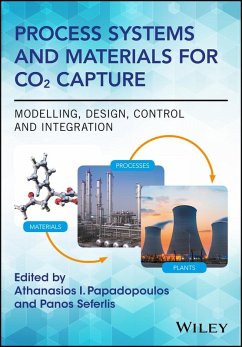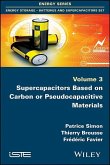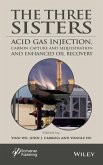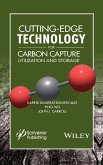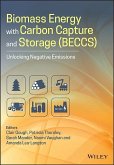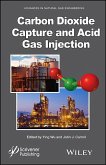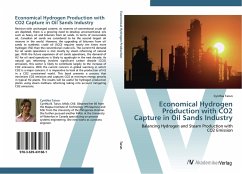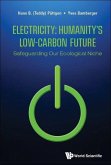Process Systems and Materials for CO2 Capture
Modelling, Design, Control and Integration
Herausgeber: Papadopoulos, Athanasios I; Seferlis, Panos
Process Systems and Materials for CO2 Capture
Modelling, Design, Control and Integration
Herausgeber: Papadopoulos, Athanasios I; Seferlis, Panos
- Gebundenes Buch
- Merkliste
- Auf die Merkliste
- Bewerten Bewerten
- Teilen
- Produkt teilen
- Produkterinnerung
- Produkterinnerung
Computer-aided approaches enable the fast, automated and accurate evaluation of a vast number of process and material characteristics that lead to economically efficient and sustainable CO2 capture systems. In this context, they offer a promising route to exploit experimental know-how and guide the search for novel and efficient CO2 capture processes and materials. This comprehensive volume brings together an extensive collection of systematic computer-aided tools and methods developed in recent years for CO2 capture applications, and presents a structured and organized account of works from…mehr
Andere Kunden interessierten sich auch für
![Supercapacitors Based on Carbon or Pseudocapacitive Materials Supercapacitors Based on Carbon or Pseudocapacitive Materials]() Patrice SimonSupercapacitors Based on Carbon or Pseudocapacitive Materials179,99 €
Patrice SimonSupercapacitors Based on Carbon or Pseudocapacitive Materials179,99 €![The Three Sisters The Three Sisters]() The Three Sisters282,99 €
The Three Sisters282,99 €![Cutting-Edge Technology for Carbon Capture, Utilization, and Storage Cutting-Edge Technology for Carbon Capture, Utilization, and Storage]() Cutting-Edge Technology for Carbon Capture, Utilization, and Storage273,99 €
Cutting-Edge Technology for Carbon Capture, Utilization, and Storage273,99 €![Biomass Energy with Carbon Capture and Storage (Beccs) Biomass Energy with Carbon Capture and Storage (Beccs)]() Biomass Energy with Carbon Capture and Storage (Beccs)123,99 €
Biomass Energy with Carbon Capture and Storage (Beccs)123,99 €![Carbon Dioxide Capture and Acid Gas Injection Carbon Dioxide Capture and Acid Gas Injection]() Carbon Dioxide Capture and Acid Gas Injection254,99 €
Carbon Dioxide Capture and Acid Gas Injection254,99 €![Economical Hydrogen Production with CO2 Capture in Oil Sands Industry Economical Hydrogen Production with CO2 Capture in Oil Sands Industry]() Cynthia TarunEconomical Hydrogen Production with CO2 Capture in Oil Sands Industry41,99 €
Cynthia TarunEconomical Hydrogen Production with CO2 Capture in Oil Sands Industry41,99 €![Electricity: Humanity's Low-Carbon Future - Safeguarding Our Ecological Niche Electricity: Humanity's Low-Carbon Future - Safeguarding Our Ecological Niche]() PuttgenElectricity: Humanity's Low-Carbon Future - Safeguarding Our Ecological Niche62,99 €
PuttgenElectricity: Humanity's Low-Carbon Future - Safeguarding Our Ecological Niche62,99 €-
-
-
Computer-aided approaches enable the fast, automated and accurate evaluation of a vast number of process and material characteristics that lead to economically efficient and sustainable CO2 capture systems. In this context, they offer a promising route to exploit experimental know-how and guide the search for novel and efficient CO2 capture processes and materials. This comprehensive volume brings together an extensive collection of systematic computer-aided tools and methods developed in recent years for CO2 capture applications, and presents a structured and organized account of works from internationally acknowledged scientists and engineers, through: * modelling of materials and processes based on chemical and physical principles * design of materials and processes based on systematic optimization methods * utilization of advanced control and integration methods in process and plant-wide operations. The tools and methods described are illustrated through case studies on materials such as solvents, adsorbents and membranes, and on processes such as absorption/desorption, pressure and vacuum swing adsorption, membranes, oxycombustion, solid looping, etc. Process Systems and Materials for CO2 Capture: Modelling, Design, Control and Integration should become the essential introductory resource for researchers and industrial practitioners in the field of CO2 capture technology who wish to explore developments in computer-aided tools and methods. In addition, it aims to introduce CO2 capture technologies to process systems engineers working in the development of general computational tools and methods by highlighting opportunities for new developments to address the needs and challenges in CO2 capture technologies.
Hinweis: Dieser Artikel kann nur an eine deutsche Lieferadresse ausgeliefert werden.
Hinweis: Dieser Artikel kann nur an eine deutsche Lieferadresse ausgeliefert werden.
Produktdetails
- Produktdetails
- Verlag: Wiley
- Seitenzahl: 680
- Erscheinungstermin: 1. Mai 2017
- Englisch
- Abmessung: 249mm x 175mm x 38mm
- Gewicht: 1179g
- ISBN-13: 9781119106449
- ISBN-10: 1119106443
- Artikelnr.: 48251112
- Herstellerkennzeichnung
- Libri GmbH
- Europaallee 1
- 36244 Bad Hersfeld
- gpsr@libri.de
- Verlag: Wiley
- Seitenzahl: 680
- Erscheinungstermin: 1. Mai 2017
- Englisch
- Abmessung: 249mm x 175mm x 38mm
- Gewicht: 1179g
- ISBN-13: 9781119106449
- ISBN-10: 1119106443
- Artikelnr.: 48251112
- Herstellerkennzeichnung
- Libri GmbH
- Europaallee 1
- 36244 Bad Hersfeld
- gpsr@libri.de
Edited by ATHANASIOS I. PAPADOPOULOS, Chemical Process and Energy Resources Institute, Centre for Research and Technology Hellas, Greece PANOS SEFERLIS, Department of Mechanical Engineering, Aristotle University of Thessaloniki, Greece
About the Editors xvii List of Contributors xix Preface xxvii Section 1 Modelling and Design of Materials 1 1 The Development of a Molecular Systems Engineering Approach to the Design of Carbon
capture Solvents 3 Edward Graham, Smitha Gopinath, Esther Forte, George Jackson, Amparo Galindo, and Claire S. Adjiman 1.1 Introduction 3 1.2 Predictive Thermodynamic Models for the Integrated Molecular and Process Design of Physical Absorption Processes 6 1.3 Describing Chemical Equilibria with SAFT 16 1.4 Integrated Computer
aided Molecular and Process Design using SAFT 24 1.5 Conclusions 29 List of Abbreviations 30 Acknowledgments 31 References 31 2 Methods and Modelling for Post
combustion CO2 Capture 43 Philip Fosbøl, Nicolas von Solms, Arne Gladis, Kaj Thomsen, and Georgios M. Kontogeorgis 2.1 Introduction to Post
combustion CO2 Capture: The Role of Solvents and Some Engineering Challenges 43 2.2 Extended UNIQUAC: A Successful Thermodynamic Model for CCS Applications 49 2.3 CO2 Capture using Alkanolamines: Thermodynamics and Design 60 2.4 CO2 Capture using Ammonia: Thermodynamics and Design 61 2.5 New Solvents: Enzymes, Hydrates, Phase Change Solvents 62 2.6 Pilot Plant Studies: Measurements and Modelling 69 2.7 Conclusions and Future Perspectives 69 List of Abbreviations 74 Acknowledgements 74 References 74 3 Molecular Simulation Methods for CO2 Capture and Gas Separation with Emphasis on Ionic Liquids 79 Niki Vergadou, Eleni Androulaki, and Ioannis G. Economou 3.1 Introduction 79 3.2 Molecular Simulation Methods for Property Calculations 83 3.3 Force Fields 85 3.4 Results and Discussion: The Case of the IOLICAP Project 87 3.5 Future Outlook 101 List of Abbreviations 102 Acknowledgments 103 References 103 4 Thermodynamics of Aqueous Methyldiethanolamine/Piperazine for CO2 Capture 113 Peter T. Frailie, Jorge M. Plaza, and Gary T. Rochelle 4.1 Introduction 113 4.2 Model Description 114 4.3 Sequential Regression Methodology 115 4.4 Model Regression 115 4.5 Conclusions 134 List of Abbreviations 134 Acknowledgements 134 References 135 5 Kinetics of Aqueous Methyldiethanolamine/Piperazine for CO2 Capture 137 Peter T. Frailie and Gary T. Rochelle 5.1 Introduction 137 5.2 Methodology 138 5.3 Results 143 5.4 Conclusions 150 List of Abbreviations 151 Acknowledgements 151 References 151 6 Uncertainties in Modelling the Environmental Impact of Solvent Loss through Degradation for Amine Screening Purposes in Post
combustion CO2 Capture 153 Sara Badr, Stavros Papadokonstantakis, Robert Bennett, Graeme Puxty, and Konrad Hungerbuehler 6.1 Introduction 153 6.2 Oxidative Degradation 156 6.3 Environmental Impacts of Solvent Production 165 6.4 Conclusions and Outlook 167 List of Abbreviations 168 References 169 7 Computer
aided Molecular Design of CO2 Capture Solvents and Mixtures 173 Athanasios I. Papadopoulos, Theodoros Zarogiannis, and Panos Seferlis 7.1 Introduction 173 7.2 Overview of Associated Literature 176 7.3 Optimization
based Design and Selection Approach 178 7.4 Implementation 183 7.5 Results and Discussion 187 7.6 Conclusions 196 List of Abbreviations 196 Acknowledgements 197 References 197 8 Ionic Liquid Design for Biomass
based Tri
generation System with Carbon Capture 203 Fah Keen Chong, Viknesh Andiappan, Fadwa T. Eljack, Dominic C. Y. Foo, Nishanth G. Chemmangattuvalappil, and Denny K. S. Ng 8.1 Introduction 203 8.2 Formulations to Design Ionic Liquid for BECCS 205 8.3 An Illustrative Example 212 8.4 Conclusions 221 List of Abbreviations 222 References 225 Section 2 From Materials to Process Modelling, Design and Intensification 229 9 Multi
scale Process Systems Engineering for Carbon Capture, Utilization, and Storage: A Review 231 M. M. Faruque Hasan 9.1 Introduction 231 9.2 Multi
scale Approaches for CCUS Design and Optimization 233 9.3 Hierarchical Approaches 234 9.4 Simultaneous Approaches 237 9.5 Enabling Methods, Challenges, and Research Opportunities 242 List of Abbreviations 243 References 244 10 Membrane System Design for CO2 Capture: From Molecular Modeling to Process Simulation 249 Xuezhong He, Daniel R. Nieto, Arne Lindbråthen, and May
Britt Hägg 10.1 Introduction 249 10.2 Membranes for Gas Separation 250 10.3 Molecular Modeling of Gas Separation in Membranes 255 10.4 Process Simulation of Membranes for CO2 Capture 260 10.5 Future Perspectives 273 List of Abbreviations 274 Acknowledgments 276 References 276 11 Post
combustion CO2 Capture by Chemical Gas-Liquid Absorption: Solvent Selection, Process Modelling, Energy Integration and Design Methods 283 Thibaut Neveux, Yann Le Moullec, and Éric Favre 11.1 Introduction 283 11.2 Solvent Influence 284 11.3 Process Modelling 286 11.4 Process Integration 291 11.5 Design Method 300 11.6 Conclusion 306 List of Abbreviations 308 References 308 12 Innovative Computational Tools and Models for the Design, Optimization and Control of Carbon Capture Processes 311 David C. Miller, Deb Agarwal, Debangsu Bhattacharyya, Joshua Boverhof , Yang Chen, John Eslick, Jim Leek, Jinliang Ma, Priyadarshi Mahapatra, Brenda Ng, Nikolaos V. Sahinidis, Charles Tong, and Stephen E. Zitney 12.1 Overview 311 12.2 Advanced Computational Frameworks 313 12.3 Case Study: Solid Sorbent Carbon Capture System 326 12.4 Summary 335 Acknowledgment 338 List of Abbreviations 338 References 339 13 Modelling and Optimization of Pressure Swing Adsorption (PSA) Processes for Post
combustion CO2 Capture from Flue Gas 343 George N. Nikolaidis, Eustathios S. Kikkinides, and Michael C. Georgiadis 13.1 Introduction 343 13.2 Mathematical Model Formulation 346 13.3 PSA/VSA Simulation Case Studies 352 13.4 PSA/VSA Optimization Case Study 359 13.5 Conclusions 362 List of Abbreviations 365 Acknowledgements 366 References 367 14 Joule Thomson Effect in a Twödimensional Multi
component Radial Crossflow Hollow Fiber Membrane Applied for CO2 Capture in Natural Gas Sweetening 371 Serene Sow Mun Lock, Kok Keong Lau, Azmi Mohd Shariff, and Yin Fong Yeong 14.1 Introduction 371 14.2 Methodology 373 14.3 Results and Discussion 384 14.4 Conclusion 393 List of Abbreviations 394 Acknowledgments 394 References 394 15 The Challenge of Reducing the Size of an Absorber Using a Rotating Packed Bed 399 Ming
Tsz Chen, David Shan Hill Wong, and Chung Sung Tan 15.1 Motivation for Size Reduction 399 15.2 Rotating Packed Bed Technology 401 15.3 Experimental Work on CO2 Capture Using a Rotating Packed Bed 405 15.4 Modeling of CO2 Capture using a Rotating Packed Bed 409 15.5 Design of Rotating Packed Bed Absorbers and Real Work Comparison to Regular Packed Absorbers 410 15.6 Conclusions 417 List of Abbreviations 417 References 418 Section 3 Process Operation and Control 425 16 Plantwide Design and Operation of CO2 Capture Using Chemical Absorption 427 David Shan Hill Wong and Shi
Shang Jang 16.1 Introduction 427 16.2 The Basic Process 428 16.3 Solvent Selection 429 16.4 Energy Consumption Targets 429 16.5 Steady
state Process Modeling 431 16.6 Conceptual Process Integration 432 16.7 Column Internals 432 16.8 Dynamic Modeling 433 16.9 Plantwide Control 434 16.10 Flexible Operation 434 16.11 Water and Amine Management 435 16.12 SOx Treatment 436 16.13 Monitoring 436 16.14 Conclusions 437 List of Abbreviations 437 References 437 17 Multi
period Design of Carbon Capture Systems for Flexible Operation 447 Nial Mac Dowell and Nilay Shah 17.1 Introduction 447 17.2 Evaluation of Flexible Operation 451 17.3 Scenario Comparison 457 17.4 Conclusions 459 List of Abbreviations 460 Acknowledgements 460 References 461 18 Improved Design and Operation of Post
combustion CO2 Capture Processes with Process Modelling 463 Adekola Lawal, Javier Rodriguez, Alfredo Ramos, Gerardo Sanchis, Mario Calado, Nouri Samsatli, Eni Oko, and Meihong Wang 18.1 Introduction 463 18.2 The gCCS Whole
chain System Modelling Environment 464 18.3 Typical Process Design Considerations in a Simulation Study 467 18.4 Safety Considerations: Anticipating Hazards 477 18.5 Process Operating Considerations 479 18.6 Conclusions 497 List of Abbreviations 498 References 498 19 Advanced Control Strategies for IGCC Plants with Membrane Reactors for CO2 Capture 501 Fernando V. Lima, Xin He, Rishi Amrit, and Prodromos Daoutidis 19.1 Introduction 501 19.2 Modelling Approach 503 19.3 Design and Simulation Conditions 507 19.4 Model Predictive Control Strategies 508 19.5 Closed
loop Simulation Results 512 19.6 Conclusions 518 List of Abbreviations 518 Acknowledgements 519 References 519 20 An Integration Framework for CO2 Capture Processes 523 M. Hossein Sahraei and Luis A. Ricardez-Sandoval 20.1 Introduction 523 20.2 Automation Framework and Syntax 525 20.3 CO2 Capture Plant Model 528 20.4 Case Studies 530 20.5 Conclusions 540 List of Abbreviations 541 References 541 21 Operability Analysis in Solvent
based Post
combustion CO2 Capture Plants 545 Theodoros Damartzis, Athanasios I. Papadopoulos, and Panos Seferlis 21.1 Introduction 545 21.2 Framework for the Analysis of Operability 548 21.3 Framework Implementation 552 21.4 Results and Discussion 556 21.5 Conclusions 566 List of Abbreviations 567 Acknowledgments 567 References 567 Section 4 Integrated Technologies 571 22 Process Systems Engineering for Optimal Design and Operation of Oxycombustion 573 Alexander Mitsos 22.1 Introduction 573 22.2 Pressurized Oxycombustion of Coal 575 22.3 Membrane
based Processes 578 22.4 Conclusions and Future Work 585 List of Abbreviations 585 Acknowledgments 585 References 586 23 Energy Integration of Processes for Solid Looping CO2 Capture Systems 589 Pilar Lisbona, Yolanda Lara, Ana Martínez, and Luis M. Romeo 23.1 Introduction 589 23.2 Internal Integration for Energy Savings 592 23.3 External Integration for Energy Use 597 23.4 Process Symbiosis 601 23.5 Final Remarks 605 List of Abbreviations 605 References 605 24 Process Simulation of a Dual
stage Selexol Process for Pre
combustion Carbon Capture at an Integrated Gasification Combined Cycle Power Plant 609 Hyungwoong Ahn 24.1 Introduction 609 24.2 Configuration of an Absorption Process for Pre
combustion Carbon Capture 610 24.3 Solubility Model 616 24.4 Conventional Dual
stage Selexol Process 619 24.5 Unintegrated Solvent Cycle Design 624 24.6 95% Carbon Capture Efficiency 625 24.7 Conclusions 626 List of Abbreviations 627 References 627 25 Optimized Lignite
fired Power Plants with Post
combustion CO2 Capture 629 Emmanouil K. Kakaras, Antonios K. Koumanakos, and Aggelos F. Doukelis 25.1 Introduction 629 25.2 Reducing the Energy Efficiency Penalty 630 25.3 Optimized Plants with Amine Scrubbing: Greenfield Case 631 25.4 Oxyfuel and Amine Scrubbing Hybrid CO2 Capture 635 25.5 Conclusions 645 List of Abbreviations 645 References 645 Index 649
capture Solvents 3 Edward Graham, Smitha Gopinath, Esther Forte, George Jackson, Amparo Galindo, and Claire S. Adjiman 1.1 Introduction 3 1.2 Predictive Thermodynamic Models for the Integrated Molecular and Process Design of Physical Absorption Processes 6 1.3 Describing Chemical Equilibria with SAFT 16 1.4 Integrated Computer
aided Molecular and Process Design using SAFT 24 1.5 Conclusions 29 List of Abbreviations 30 Acknowledgments 31 References 31 2 Methods and Modelling for Post
combustion CO2 Capture 43 Philip Fosbøl, Nicolas von Solms, Arne Gladis, Kaj Thomsen, and Georgios M. Kontogeorgis 2.1 Introduction to Post
combustion CO2 Capture: The Role of Solvents and Some Engineering Challenges 43 2.2 Extended UNIQUAC: A Successful Thermodynamic Model for CCS Applications 49 2.3 CO2 Capture using Alkanolamines: Thermodynamics and Design 60 2.4 CO2 Capture using Ammonia: Thermodynamics and Design 61 2.5 New Solvents: Enzymes, Hydrates, Phase Change Solvents 62 2.6 Pilot Plant Studies: Measurements and Modelling 69 2.7 Conclusions and Future Perspectives 69 List of Abbreviations 74 Acknowledgements 74 References 74 3 Molecular Simulation Methods for CO2 Capture and Gas Separation with Emphasis on Ionic Liquids 79 Niki Vergadou, Eleni Androulaki, and Ioannis G. Economou 3.1 Introduction 79 3.2 Molecular Simulation Methods for Property Calculations 83 3.3 Force Fields 85 3.4 Results and Discussion: The Case of the IOLICAP Project 87 3.5 Future Outlook 101 List of Abbreviations 102 Acknowledgments 103 References 103 4 Thermodynamics of Aqueous Methyldiethanolamine/Piperazine for CO2 Capture 113 Peter T. Frailie, Jorge M. Plaza, and Gary T. Rochelle 4.1 Introduction 113 4.2 Model Description 114 4.3 Sequential Regression Methodology 115 4.4 Model Regression 115 4.5 Conclusions 134 List of Abbreviations 134 Acknowledgements 134 References 135 5 Kinetics of Aqueous Methyldiethanolamine/Piperazine for CO2 Capture 137 Peter T. Frailie and Gary T. Rochelle 5.1 Introduction 137 5.2 Methodology 138 5.3 Results 143 5.4 Conclusions 150 List of Abbreviations 151 Acknowledgements 151 References 151 6 Uncertainties in Modelling the Environmental Impact of Solvent Loss through Degradation for Amine Screening Purposes in Post
combustion CO2 Capture 153 Sara Badr, Stavros Papadokonstantakis, Robert Bennett, Graeme Puxty, and Konrad Hungerbuehler 6.1 Introduction 153 6.2 Oxidative Degradation 156 6.3 Environmental Impacts of Solvent Production 165 6.4 Conclusions and Outlook 167 List of Abbreviations 168 References 169 7 Computer
aided Molecular Design of CO2 Capture Solvents and Mixtures 173 Athanasios I. Papadopoulos, Theodoros Zarogiannis, and Panos Seferlis 7.1 Introduction 173 7.2 Overview of Associated Literature 176 7.3 Optimization
based Design and Selection Approach 178 7.4 Implementation 183 7.5 Results and Discussion 187 7.6 Conclusions 196 List of Abbreviations 196 Acknowledgements 197 References 197 8 Ionic Liquid Design for Biomass
based Tri
generation System with Carbon Capture 203 Fah Keen Chong, Viknesh Andiappan, Fadwa T. Eljack, Dominic C. Y. Foo, Nishanth G. Chemmangattuvalappil, and Denny K. S. Ng 8.1 Introduction 203 8.2 Formulations to Design Ionic Liquid for BECCS 205 8.3 An Illustrative Example 212 8.4 Conclusions 221 List of Abbreviations 222 References 225 Section 2 From Materials to Process Modelling, Design and Intensification 229 9 Multi
scale Process Systems Engineering for Carbon Capture, Utilization, and Storage: A Review 231 M. M. Faruque Hasan 9.1 Introduction 231 9.2 Multi
scale Approaches for CCUS Design and Optimization 233 9.3 Hierarchical Approaches 234 9.4 Simultaneous Approaches 237 9.5 Enabling Methods, Challenges, and Research Opportunities 242 List of Abbreviations 243 References 244 10 Membrane System Design for CO2 Capture: From Molecular Modeling to Process Simulation 249 Xuezhong He, Daniel R. Nieto, Arne Lindbråthen, and May
Britt Hägg 10.1 Introduction 249 10.2 Membranes for Gas Separation 250 10.3 Molecular Modeling of Gas Separation in Membranes 255 10.4 Process Simulation of Membranes for CO2 Capture 260 10.5 Future Perspectives 273 List of Abbreviations 274 Acknowledgments 276 References 276 11 Post
combustion CO2 Capture by Chemical Gas-Liquid Absorption: Solvent Selection, Process Modelling, Energy Integration and Design Methods 283 Thibaut Neveux, Yann Le Moullec, and Éric Favre 11.1 Introduction 283 11.2 Solvent Influence 284 11.3 Process Modelling 286 11.4 Process Integration 291 11.5 Design Method 300 11.6 Conclusion 306 List of Abbreviations 308 References 308 12 Innovative Computational Tools and Models for the Design, Optimization and Control of Carbon Capture Processes 311 David C. Miller, Deb Agarwal, Debangsu Bhattacharyya, Joshua Boverhof , Yang Chen, John Eslick, Jim Leek, Jinliang Ma, Priyadarshi Mahapatra, Brenda Ng, Nikolaos V. Sahinidis, Charles Tong, and Stephen E. Zitney 12.1 Overview 311 12.2 Advanced Computational Frameworks 313 12.3 Case Study: Solid Sorbent Carbon Capture System 326 12.4 Summary 335 Acknowledgment 338 List of Abbreviations 338 References 339 13 Modelling and Optimization of Pressure Swing Adsorption (PSA) Processes for Post
combustion CO2 Capture from Flue Gas 343 George N. Nikolaidis, Eustathios S. Kikkinides, and Michael C. Georgiadis 13.1 Introduction 343 13.2 Mathematical Model Formulation 346 13.3 PSA/VSA Simulation Case Studies 352 13.4 PSA/VSA Optimization Case Study 359 13.5 Conclusions 362 List of Abbreviations 365 Acknowledgements 366 References 367 14 Joule Thomson Effect in a Twödimensional Multi
component Radial Crossflow Hollow Fiber Membrane Applied for CO2 Capture in Natural Gas Sweetening 371 Serene Sow Mun Lock, Kok Keong Lau, Azmi Mohd Shariff, and Yin Fong Yeong 14.1 Introduction 371 14.2 Methodology 373 14.3 Results and Discussion 384 14.4 Conclusion 393 List of Abbreviations 394 Acknowledgments 394 References 394 15 The Challenge of Reducing the Size of an Absorber Using a Rotating Packed Bed 399 Ming
Tsz Chen, David Shan Hill Wong, and Chung Sung Tan 15.1 Motivation for Size Reduction 399 15.2 Rotating Packed Bed Technology 401 15.3 Experimental Work on CO2 Capture Using a Rotating Packed Bed 405 15.4 Modeling of CO2 Capture using a Rotating Packed Bed 409 15.5 Design of Rotating Packed Bed Absorbers and Real Work Comparison to Regular Packed Absorbers 410 15.6 Conclusions 417 List of Abbreviations 417 References 418 Section 3 Process Operation and Control 425 16 Plantwide Design and Operation of CO2 Capture Using Chemical Absorption 427 David Shan Hill Wong and Shi
Shang Jang 16.1 Introduction 427 16.2 The Basic Process 428 16.3 Solvent Selection 429 16.4 Energy Consumption Targets 429 16.5 Steady
state Process Modeling 431 16.6 Conceptual Process Integration 432 16.7 Column Internals 432 16.8 Dynamic Modeling 433 16.9 Plantwide Control 434 16.10 Flexible Operation 434 16.11 Water and Amine Management 435 16.12 SOx Treatment 436 16.13 Monitoring 436 16.14 Conclusions 437 List of Abbreviations 437 References 437 17 Multi
period Design of Carbon Capture Systems for Flexible Operation 447 Nial Mac Dowell and Nilay Shah 17.1 Introduction 447 17.2 Evaluation of Flexible Operation 451 17.3 Scenario Comparison 457 17.4 Conclusions 459 List of Abbreviations 460 Acknowledgements 460 References 461 18 Improved Design and Operation of Post
combustion CO2 Capture Processes with Process Modelling 463 Adekola Lawal, Javier Rodriguez, Alfredo Ramos, Gerardo Sanchis, Mario Calado, Nouri Samsatli, Eni Oko, and Meihong Wang 18.1 Introduction 463 18.2 The gCCS Whole
chain System Modelling Environment 464 18.3 Typical Process Design Considerations in a Simulation Study 467 18.4 Safety Considerations: Anticipating Hazards 477 18.5 Process Operating Considerations 479 18.6 Conclusions 497 List of Abbreviations 498 References 498 19 Advanced Control Strategies for IGCC Plants with Membrane Reactors for CO2 Capture 501 Fernando V. Lima, Xin He, Rishi Amrit, and Prodromos Daoutidis 19.1 Introduction 501 19.2 Modelling Approach 503 19.3 Design and Simulation Conditions 507 19.4 Model Predictive Control Strategies 508 19.5 Closed
loop Simulation Results 512 19.6 Conclusions 518 List of Abbreviations 518 Acknowledgements 519 References 519 20 An Integration Framework for CO2 Capture Processes 523 M. Hossein Sahraei and Luis A. Ricardez-Sandoval 20.1 Introduction 523 20.2 Automation Framework and Syntax 525 20.3 CO2 Capture Plant Model 528 20.4 Case Studies 530 20.5 Conclusions 540 List of Abbreviations 541 References 541 21 Operability Analysis in Solvent
based Post
combustion CO2 Capture Plants 545 Theodoros Damartzis, Athanasios I. Papadopoulos, and Panos Seferlis 21.1 Introduction 545 21.2 Framework for the Analysis of Operability 548 21.3 Framework Implementation 552 21.4 Results and Discussion 556 21.5 Conclusions 566 List of Abbreviations 567 Acknowledgments 567 References 567 Section 4 Integrated Technologies 571 22 Process Systems Engineering for Optimal Design and Operation of Oxycombustion 573 Alexander Mitsos 22.1 Introduction 573 22.2 Pressurized Oxycombustion of Coal 575 22.3 Membrane
based Processes 578 22.4 Conclusions and Future Work 585 List of Abbreviations 585 Acknowledgments 585 References 586 23 Energy Integration of Processes for Solid Looping CO2 Capture Systems 589 Pilar Lisbona, Yolanda Lara, Ana Martínez, and Luis M. Romeo 23.1 Introduction 589 23.2 Internal Integration for Energy Savings 592 23.3 External Integration for Energy Use 597 23.4 Process Symbiosis 601 23.5 Final Remarks 605 List of Abbreviations 605 References 605 24 Process Simulation of a Dual
stage Selexol Process for Pre
combustion Carbon Capture at an Integrated Gasification Combined Cycle Power Plant 609 Hyungwoong Ahn 24.1 Introduction 609 24.2 Configuration of an Absorption Process for Pre
combustion Carbon Capture 610 24.3 Solubility Model 616 24.4 Conventional Dual
stage Selexol Process 619 24.5 Unintegrated Solvent Cycle Design 624 24.6 95% Carbon Capture Efficiency 625 24.7 Conclusions 626 List of Abbreviations 627 References 627 25 Optimized Lignite
fired Power Plants with Post
combustion CO2 Capture 629 Emmanouil K. Kakaras, Antonios K. Koumanakos, and Aggelos F. Doukelis 25.1 Introduction 629 25.2 Reducing the Energy Efficiency Penalty 630 25.3 Optimized Plants with Amine Scrubbing: Greenfield Case 631 25.4 Oxyfuel and Amine Scrubbing Hybrid CO2 Capture 635 25.5 Conclusions 645 List of Abbreviations 645 References 645 Index 649
About the Editors xvii List of Contributors xix Preface xxvii Section 1 Modelling and Design of Materials 1 1 The Development of a Molecular Systems Engineering Approach to the Design of Carbon
capture Solvents 3 Edward Graham, Smitha Gopinath, Esther Forte, George Jackson, Amparo Galindo, and Claire S. Adjiman 1.1 Introduction 3 1.2 Predictive Thermodynamic Models for the Integrated Molecular and Process Design of Physical Absorption Processes 6 1.3 Describing Chemical Equilibria with SAFT 16 1.4 Integrated Computer
aided Molecular and Process Design using SAFT 24 1.5 Conclusions 29 List of Abbreviations 30 Acknowledgments 31 References 31 2 Methods and Modelling for Post
combustion CO2 Capture 43 Philip Fosbøl, Nicolas von Solms, Arne Gladis, Kaj Thomsen, and Georgios M. Kontogeorgis 2.1 Introduction to Post
combustion CO2 Capture: The Role of Solvents and Some Engineering Challenges 43 2.2 Extended UNIQUAC: A Successful Thermodynamic Model for CCS Applications 49 2.3 CO2 Capture using Alkanolamines: Thermodynamics and Design 60 2.4 CO2 Capture using Ammonia: Thermodynamics and Design 61 2.5 New Solvents: Enzymes, Hydrates, Phase Change Solvents 62 2.6 Pilot Plant Studies: Measurements and Modelling 69 2.7 Conclusions and Future Perspectives 69 List of Abbreviations 74 Acknowledgements 74 References 74 3 Molecular Simulation Methods for CO2 Capture and Gas Separation with Emphasis on Ionic Liquids 79 Niki Vergadou, Eleni Androulaki, and Ioannis G. Economou 3.1 Introduction 79 3.2 Molecular Simulation Methods for Property Calculations 83 3.3 Force Fields 85 3.4 Results and Discussion: The Case of the IOLICAP Project 87 3.5 Future Outlook 101 List of Abbreviations 102 Acknowledgments 103 References 103 4 Thermodynamics of Aqueous Methyldiethanolamine/Piperazine for CO2 Capture 113 Peter T. Frailie, Jorge M. Plaza, and Gary T. Rochelle 4.1 Introduction 113 4.2 Model Description 114 4.3 Sequential Regression Methodology 115 4.4 Model Regression 115 4.5 Conclusions 134 List of Abbreviations 134 Acknowledgements 134 References 135 5 Kinetics of Aqueous Methyldiethanolamine/Piperazine for CO2 Capture 137 Peter T. Frailie and Gary T. Rochelle 5.1 Introduction 137 5.2 Methodology 138 5.3 Results 143 5.4 Conclusions 150 List of Abbreviations 151 Acknowledgements 151 References 151 6 Uncertainties in Modelling the Environmental Impact of Solvent Loss through Degradation for Amine Screening Purposes in Post
combustion CO2 Capture 153 Sara Badr, Stavros Papadokonstantakis, Robert Bennett, Graeme Puxty, and Konrad Hungerbuehler 6.1 Introduction 153 6.2 Oxidative Degradation 156 6.3 Environmental Impacts of Solvent Production 165 6.4 Conclusions and Outlook 167 List of Abbreviations 168 References 169 7 Computer
aided Molecular Design of CO2 Capture Solvents and Mixtures 173 Athanasios I. Papadopoulos, Theodoros Zarogiannis, and Panos Seferlis 7.1 Introduction 173 7.2 Overview of Associated Literature 176 7.3 Optimization
based Design and Selection Approach 178 7.4 Implementation 183 7.5 Results and Discussion 187 7.6 Conclusions 196 List of Abbreviations 196 Acknowledgements 197 References 197 8 Ionic Liquid Design for Biomass
based Tri
generation System with Carbon Capture 203 Fah Keen Chong, Viknesh Andiappan, Fadwa T. Eljack, Dominic C. Y. Foo, Nishanth G. Chemmangattuvalappil, and Denny K. S. Ng 8.1 Introduction 203 8.2 Formulations to Design Ionic Liquid for BECCS 205 8.3 An Illustrative Example 212 8.4 Conclusions 221 List of Abbreviations 222 References 225 Section 2 From Materials to Process Modelling, Design and Intensification 229 9 Multi
scale Process Systems Engineering for Carbon Capture, Utilization, and Storage: A Review 231 M. M. Faruque Hasan 9.1 Introduction 231 9.2 Multi
scale Approaches for CCUS Design and Optimization 233 9.3 Hierarchical Approaches 234 9.4 Simultaneous Approaches 237 9.5 Enabling Methods, Challenges, and Research Opportunities 242 List of Abbreviations 243 References 244 10 Membrane System Design for CO2 Capture: From Molecular Modeling to Process Simulation 249 Xuezhong He, Daniel R. Nieto, Arne Lindbråthen, and May
Britt Hägg 10.1 Introduction 249 10.2 Membranes for Gas Separation 250 10.3 Molecular Modeling of Gas Separation in Membranes 255 10.4 Process Simulation of Membranes for CO2 Capture 260 10.5 Future Perspectives 273 List of Abbreviations 274 Acknowledgments 276 References 276 11 Post
combustion CO2 Capture by Chemical Gas-Liquid Absorption: Solvent Selection, Process Modelling, Energy Integration and Design Methods 283 Thibaut Neveux, Yann Le Moullec, and Éric Favre 11.1 Introduction 283 11.2 Solvent Influence 284 11.3 Process Modelling 286 11.4 Process Integration 291 11.5 Design Method 300 11.6 Conclusion 306 List of Abbreviations 308 References 308 12 Innovative Computational Tools and Models for the Design, Optimization and Control of Carbon Capture Processes 311 David C. Miller, Deb Agarwal, Debangsu Bhattacharyya, Joshua Boverhof , Yang Chen, John Eslick, Jim Leek, Jinliang Ma, Priyadarshi Mahapatra, Brenda Ng, Nikolaos V. Sahinidis, Charles Tong, and Stephen E. Zitney 12.1 Overview 311 12.2 Advanced Computational Frameworks 313 12.3 Case Study: Solid Sorbent Carbon Capture System 326 12.4 Summary 335 Acknowledgment 338 List of Abbreviations 338 References 339 13 Modelling and Optimization of Pressure Swing Adsorption (PSA) Processes for Post
combustion CO2 Capture from Flue Gas 343 George N. Nikolaidis, Eustathios S. Kikkinides, and Michael C. Georgiadis 13.1 Introduction 343 13.2 Mathematical Model Formulation 346 13.3 PSA/VSA Simulation Case Studies 352 13.4 PSA/VSA Optimization Case Study 359 13.5 Conclusions 362 List of Abbreviations 365 Acknowledgements 366 References 367 14 Joule Thomson Effect in a Twödimensional Multi
component Radial Crossflow Hollow Fiber Membrane Applied for CO2 Capture in Natural Gas Sweetening 371 Serene Sow Mun Lock, Kok Keong Lau, Azmi Mohd Shariff, and Yin Fong Yeong 14.1 Introduction 371 14.2 Methodology 373 14.3 Results and Discussion 384 14.4 Conclusion 393 List of Abbreviations 394 Acknowledgments 394 References 394 15 The Challenge of Reducing the Size of an Absorber Using a Rotating Packed Bed 399 Ming
Tsz Chen, David Shan Hill Wong, and Chung Sung Tan 15.1 Motivation for Size Reduction 399 15.2 Rotating Packed Bed Technology 401 15.3 Experimental Work on CO2 Capture Using a Rotating Packed Bed 405 15.4 Modeling of CO2 Capture using a Rotating Packed Bed 409 15.5 Design of Rotating Packed Bed Absorbers and Real Work Comparison to Regular Packed Absorbers 410 15.6 Conclusions 417 List of Abbreviations 417 References 418 Section 3 Process Operation and Control 425 16 Plantwide Design and Operation of CO2 Capture Using Chemical Absorption 427 David Shan Hill Wong and Shi
Shang Jang 16.1 Introduction 427 16.2 The Basic Process 428 16.3 Solvent Selection 429 16.4 Energy Consumption Targets 429 16.5 Steady
state Process Modeling 431 16.6 Conceptual Process Integration 432 16.7 Column Internals 432 16.8 Dynamic Modeling 433 16.9 Plantwide Control 434 16.10 Flexible Operation 434 16.11 Water and Amine Management 435 16.12 SOx Treatment 436 16.13 Monitoring 436 16.14 Conclusions 437 List of Abbreviations 437 References 437 17 Multi
period Design of Carbon Capture Systems for Flexible Operation 447 Nial Mac Dowell and Nilay Shah 17.1 Introduction 447 17.2 Evaluation of Flexible Operation 451 17.3 Scenario Comparison 457 17.4 Conclusions 459 List of Abbreviations 460 Acknowledgements 460 References 461 18 Improved Design and Operation of Post
combustion CO2 Capture Processes with Process Modelling 463 Adekola Lawal, Javier Rodriguez, Alfredo Ramos, Gerardo Sanchis, Mario Calado, Nouri Samsatli, Eni Oko, and Meihong Wang 18.1 Introduction 463 18.2 The gCCS Whole
chain System Modelling Environment 464 18.3 Typical Process Design Considerations in a Simulation Study 467 18.4 Safety Considerations: Anticipating Hazards 477 18.5 Process Operating Considerations 479 18.6 Conclusions 497 List of Abbreviations 498 References 498 19 Advanced Control Strategies for IGCC Plants with Membrane Reactors for CO2 Capture 501 Fernando V. Lima, Xin He, Rishi Amrit, and Prodromos Daoutidis 19.1 Introduction 501 19.2 Modelling Approach 503 19.3 Design and Simulation Conditions 507 19.4 Model Predictive Control Strategies 508 19.5 Closed
loop Simulation Results 512 19.6 Conclusions 518 List of Abbreviations 518 Acknowledgements 519 References 519 20 An Integration Framework for CO2 Capture Processes 523 M. Hossein Sahraei and Luis A. Ricardez-Sandoval 20.1 Introduction 523 20.2 Automation Framework and Syntax 525 20.3 CO2 Capture Plant Model 528 20.4 Case Studies 530 20.5 Conclusions 540 List of Abbreviations 541 References 541 21 Operability Analysis in Solvent
based Post
combustion CO2 Capture Plants 545 Theodoros Damartzis, Athanasios I. Papadopoulos, and Panos Seferlis 21.1 Introduction 545 21.2 Framework for the Analysis of Operability 548 21.3 Framework Implementation 552 21.4 Results and Discussion 556 21.5 Conclusions 566 List of Abbreviations 567 Acknowledgments 567 References 567 Section 4 Integrated Technologies 571 22 Process Systems Engineering for Optimal Design and Operation of Oxycombustion 573 Alexander Mitsos 22.1 Introduction 573 22.2 Pressurized Oxycombustion of Coal 575 22.3 Membrane
based Processes 578 22.4 Conclusions and Future Work 585 List of Abbreviations 585 Acknowledgments 585 References 586 23 Energy Integration of Processes for Solid Looping CO2 Capture Systems 589 Pilar Lisbona, Yolanda Lara, Ana Martínez, and Luis M. Romeo 23.1 Introduction 589 23.2 Internal Integration for Energy Savings 592 23.3 External Integration for Energy Use 597 23.4 Process Symbiosis 601 23.5 Final Remarks 605 List of Abbreviations 605 References 605 24 Process Simulation of a Dual
stage Selexol Process for Pre
combustion Carbon Capture at an Integrated Gasification Combined Cycle Power Plant 609 Hyungwoong Ahn 24.1 Introduction 609 24.2 Configuration of an Absorption Process for Pre
combustion Carbon Capture 610 24.3 Solubility Model 616 24.4 Conventional Dual
stage Selexol Process 619 24.5 Unintegrated Solvent Cycle Design 624 24.6 95% Carbon Capture Efficiency 625 24.7 Conclusions 626 List of Abbreviations 627 References 627 25 Optimized Lignite
fired Power Plants with Post
combustion CO2 Capture 629 Emmanouil K. Kakaras, Antonios K. Koumanakos, and Aggelos F. Doukelis 25.1 Introduction 629 25.2 Reducing the Energy Efficiency Penalty 630 25.3 Optimized Plants with Amine Scrubbing: Greenfield Case 631 25.4 Oxyfuel and Amine Scrubbing Hybrid CO2 Capture 635 25.5 Conclusions 645 List of Abbreviations 645 References 645 Index 649
capture Solvents 3 Edward Graham, Smitha Gopinath, Esther Forte, George Jackson, Amparo Galindo, and Claire S. Adjiman 1.1 Introduction 3 1.2 Predictive Thermodynamic Models for the Integrated Molecular and Process Design of Physical Absorption Processes 6 1.3 Describing Chemical Equilibria with SAFT 16 1.4 Integrated Computer
aided Molecular and Process Design using SAFT 24 1.5 Conclusions 29 List of Abbreviations 30 Acknowledgments 31 References 31 2 Methods and Modelling for Post
combustion CO2 Capture 43 Philip Fosbøl, Nicolas von Solms, Arne Gladis, Kaj Thomsen, and Georgios M. Kontogeorgis 2.1 Introduction to Post
combustion CO2 Capture: The Role of Solvents and Some Engineering Challenges 43 2.2 Extended UNIQUAC: A Successful Thermodynamic Model for CCS Applications 49 2.3 CO2 Capture using Alkanolamines: Thermodynamics and Design 60 2.4 CO2 Capture using Ammonia: Thermodynamics and Design 61 2.5 New Solvents: Enzymes, Hydrates, Phase Change Solvents 62 2.6 Pilot Plant Studies: Measurements and Modelling 69 2.7 Conclusions and Future Perspectives 69 List of Abbreviations 74 Acknowledgements 74 References 74 3 Molecular Simulation Methods for CO2 Capture and Gas Separation with Emphasis on Ionic Liquids 79 Niki Vergadou, Eleni Androulaki, and Ioannis G. Economou 3.1 Introduction 79 3.2 Molecular Simulation Methods for Property Calculations 83 3.3 Force Fields 85 3.4 Results and Discussion: The Case of the IOLICAP Project 87 3.5 Future Outlook 101 List of Abbreviations 102 Acknowledgments 103 References 103 4 Thermodynamics of Aqueous Methyldiethanolamine/Piperazine for CO2 Capture 113 Peter T. Frailie, Jorge M. Plaza, and Gary T. Rochelle 4.1 Introduction 113 4.2 Model Description 114 4.3 Sequential Regression Methodology 115 4.4 Model Regression 115 4.5 Conclusions 134 List of Abbreviations 134 Acknowledgements 134 References 135 5 Kinetics of Aqueous Methyldiethanolamine/Piperazine for CO2 Capture 137 Peter T. Frailie and Gary T. Rochelle 5.1 Introduction 137 5.2 Methodology 138 5.3 Results 143 5.4 Conclusions 150 List of Abbreviations 151 Acknowledgements 151 References 151 6 Uncertainties in Modelling the Environmental Impact of Solvent Loss through Degradation for Amine Screening Purposes in Post
combustion CO2 Capture 153 Sara Badr, Stavros Papadokonstantakis, Robert Bennett, Graeme Puxty, and Konrad Hungerbuehler 6.1 Introduction 153 6.2 Oxidative Degradation 156 6.3 Environmental Impacts of Solvent Production 165 6.4 Conclusions and Outlook 167 List of Abbreviations 168 References 169 7 Computer
aided Molecular Design of CO2 Capture Solvents and Mixtures 173 Athanasios I. Papadopoulos, Theodoros Zarogiannis, and Panos Seferlis 7.1 Introduction 173 7.2 Overview of Associated Literature 176 7.3 Optimization
based Design and Selection Approach 178 7.4 Implementation 183 7.5 Results and Discussion 187 7.6 Conclusions 196 List of Abbreviations 196 Acknowledgements 197 References 197 8 Ionic Liquid Design for Biomass
based Tri
generation System with Carbon Capture 203 Fah Keen Chong, Viknesh Andiappan, Fadwa T. Eljack, Dominic C. Y. Foo, Nishanth G. Chemmangattuvalappil, and Denny K. S. Ng 8.1 Introduction 203 8.2 Formulations to Design Ionic Liquid for BECCS 205 8.3 An Illustrative Example 212 8.4 Conclusions 221 List of Abbreviations 222 References 225 Section 2 From Materials to Process Modelling, Design and Intensification 229 9 Multi
scale Process Systems Engineering for Carbon Capture, Utilization, and Storage: A Review 231 M. M. Faruque Hasan 9.1 Introduction 231 9.2 Multi
scale Approaches for CCUS Design and Optimization 233 9.3 Hierarchical Approaches 234 9.4 Simultaneous Approaches 237 9.5 Enabling Methods, Challenges, and Research Opportunities 242 List of Abbreviations 243 References 244 10 Membrane System Design for CO2 Capture: From Molecular Modeling to Process Simulation 249 Xuezhong He, Daniel R. Nieto, Arne Lindbråthen, and May
Britt Hägg 10.1 Introduction 249 10.2 Membranes for Gas Separation 250 10.3 Molecular Modeling of Gas Separation in Membranes 255 10.4 Process Simulation of Membranes for CO2 Capture 260 10.5 Future Perspectives 273 List of Abbreviations 274 Acknowledgments 276 References 276 11 Post
combustion CO2 Capture by Chemical Gas-Liquid Absorption: Solvent Selection, Process Modelling, Energy Integration and Design Methods 283 Thibaut Neveux, Yann Le Moullec, and Éric Favre 11.1 Introduction 283 11.2 Solvent Influence 284 11.3 Process Modelling 286 11.4 Process Integration 291 11.5 Design Method 300 11.6 Conclusion 306 List of Abbreviations 308 References 308 12 Innovative Computational Tools and Models for the Design, Optimization and Control of Carbon Capture Processes 311 David C. Miller, Deb Agarwal, Debangsu Bhattacharyya, Joshua Boverhof , Yang Chen, John Eslick, Jim Leek, Jinliang Ma, Priyadarshi Mahapatra, Brenda Ng, Nikolaos V. Sahinidis, Charles Tong, and Stephen E. Zitney 12.1 Overview 311 12.2 Advanced Computational Frameworks 313 12.3 Case Study: Solid Sorbent Carbon Capture System 326 12.4 Summary 335 Acknowledgment 338 List of Abbreviations 338 References 339 13 Modelling and Optimization of Pressure Swing Adsorption (PSA) Processes for Post
combustion CO2 Capture from Flue Gas 343 George N. Nikolaidis, Eustathios S. Kikkinides, and Michael C. Georgiadis 13.1 Introduction 343 13.2 Mathematical Model Formulation 346 13.3 PSA/VSA Simulation Case Studies 352 13.4 PSA/VSA Optimization Case Study 359 13.5 Conclusions 362 List of Abbreviations 365 Acknowledgements 366 References 367 14 Joule Thomson Effect in a Twödimensional Multi
component Radial Crossflow Hollow Fiber Membrane Applied for CO2 Capture in Natural Gas Sweetening 371 Serene Sow Mun Lock, Kok Keong Lau, Azmi Mohd Shariff, and Yin Fong Yeong 14.1 Introduction 371 14.2 Methodology 373 14.3 Results and Discussion 384 14.4 Conclusion 393 List of Abbreviations 394 Acknowledgments 394 References 394 15 The Challenge of Reducing the Size of an Absorber Using a Rotating Packed Bed 399 Ming
Tsz Chen, David Shan Hill Wong, and Chung Sung Tan 15.1 Motivation for Size Reduction 399 15.2 Rotating Packed Bed Technology 401 15.3 Experimental Work on CO2 Capture Using a Rotating Packed Bed 405 15.4 Modeling of CO2 Capture using a Rotating Packed Bed 409 15.5 Design of Rotating Packed Bed Absorbers and Real Work Comparison to Regular Packed Absorbers 410 15.6 Conclusions 417 List of Abbreviations 417 References 418 Section 3 Process Operation and Control 425 16 Plantwide Design and Operation of CO2 Capture Using Chemical Absorption 427 David Shan Hill Wong and Shi
Shang Jang 16.1 Introduction 427 16.2 The Basic Process 428 16.3 Solvent Selection 429 16.4 Energy Consumption Targets 429 16.5 Steady
state Process Modeling 431 16.6 Conceptual Process Integration 432 16.7 Column Internals 432 16.8 Dynamic Modeling 433 16.9 Plantwide Control 434 16.10 Flexible Operation 434 16.11 Water and Amine Management 435 16.12 SOx Treatment 436 16.13 Monitoring 436 16.14 Conclusions 437 List of Abbreviations 437 References 437 17 Multi
period Design of Carbon Capture Systems for Flexible Operation 447 Nial Mac Dowell and Nilay Shah 17.1 Introduction 447 17.2 Evaluation of Flexible Operation 451 17.3 Scenario Comparison 457 17.4 Conclusions 459 List of Abbreviations 460 Acknowledgements 460 References 461 18 Improved Design and Operation of Post
combustion CO2 Capture Processes with Process Modelling 463 Adekola Lawal, Javier Rodriguez, Alfredo Ramos, Gerardo Sanchis, Mario Calado, Nouri Samsatli, Eni Oko, and Meihong Wang 18.1 Introduction 463 18.2 The gCCS Whole
chain System Modelling Environment 464 18.3 Typical Process Design Considerations in a Simulation Study 467 18.4 Safety Considerations: Anticipating Hazards 477 18.5 Process Operating Considerations 479 18.6 Conclusions 497 List of Abbreviations 498 References 498 19 Advanced Control Strategies for IGCC Plants with Membrane Reactors for CO2 Capture 501 Fernando V. Lima, Xin He, Rishi Amrit, and Prodromos Daoutidis 19.1 Introduction 501 19.2 Modelling Approach 503 19.3 Design and Simulation Conditions 507 19.4 Model Predictive Control Strategies 508 19.5 Closed
loop Simulation Results 512 19.6 Conclusions 518 List of Abbreviations 518 Acknowledgements 519 References 519 20 An Integration Framework for CO2 Capture Processes 523 M. Hossein Sahraei and Luis A. Ricardez-Sandoval 20.1 Introduction 523 20.2 Automation Framework and Syntax 525 20.3 CO2 Capture Plant Model 528 20.4 Case Studies 530 20.5 Conclusions 540 List of Abbreviations 541 References 541 21 Operability Analysis in Solvent
based Post
combustion CO2 Capture Plants 545 Theodoros Damartzis, Athanasios I. Papadopoulos, and Panos Seferlis 21.1 Introduction 545 21.2 Framework for the Analysis of Operability 548 21.3 Framework Implementation 552 21.4 Results and Discussion 556 21.5 Conclusions 566 List of Abbreviations 567 Acknowledgments 567 References 567 Section 4 Integrated Technologies 571 22 Process Systems Engineering for Optimal Design and Operation of Oxycombustion 573 Alexander Mitsos 22.1 Introduction 573 22.2 Pressurized Oxycombustion of Coal 575 22.3 Membrane
based Processes 578 22.4 Conclusions and Future Work 585 List of Abbreviations 585 Acknowledgments 585 References 586 23 Energy Integration of Processes for Solid Looping CO2 Capture Systems 589 Pilar Lisbona, Yolanda Lara, Ana Martínez, and Luis M. Romeo 23.1 Introduction 589 23.2 Internal Integration for Energy Savings 592 23.3 External Integration for Energy Use 597 23.4 Process Symbiosis 601 23.5 Final Remarks 605 List of Abbreviations 605 References 605 24 Process Simulation of a Dual
stage Selexol Process for Pre
combustion Carbon Capture at an Integrated Gasification Combined Cycle Power Plant 609 Hyungwoong Ahn 24.1 Introduction 609 24.2 Configuration of an Absorption Process for Pre
combustion Carbon Capture 610 24.3 Solubility Model 616 24.4 Conventional Dual
stage Selexol Process 619 24.5 Unintegrated Solvent Cycle Design 624 24.6 95% Carbon Capture Efficiency 625 24.7 Conclusions 626 List of Abbreviations 627 References 627 25 Optimized Lignite
fired Power Plants with Post
combustion CO2 Capture 629 Emmanouil K. Kakaras, Antonios K. Koumanakos, and Aggelos F. Doukelis 25.1 Introduction 629 25.2 Reducing the Energy Efficiency Penalty 630 25.3 Optimized Plants with Amine Scrubbing: Greenfield Case 631 25.4 Oxyfuel and Amine Scrubbing Hybrid CO2 Capture 635 25.5 Conclusions 645 List of Abbreviations 645 References 645 Index 649

